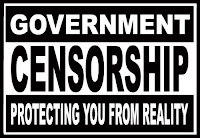Social Media Plagiarism
Plagiarism, especially for a college student, is pretty scary. The repercussion of an FF is too humiliating to think of. It is forever in your record and no one wants to hear your side of the story. I got a close call once. I had refused to put quotation marks on a quote, even though I did accredit and introduce the quote. Well, I got dropped a letter grade. I stewed for a while because I had put in a lot of effort on the paper, but was grateful that I didn't get an F or the disastrous FF. Since, I have been very careful of my attributions. However, I do not carry this carefulness to social media. Most especially on Twitter, but not so much on Facebook. Well, twitter's 140-character limit doesn't allow much for accreditation. It is enough to say "I love and care about you," but sometimes isn't enough to implement originality and honesty. For example, sometimes I find this really amazing quote and I tweet it. Problem is that the quote is probably too long that even normal twitlanguage editing just barely cuts it, leaving no room for citing.I have had followers/followees complain about people blatantly stealing their bio page, and retweeting their tweets without the usual RT and removing their handles. Thereby making the quote theirs.
Perhaps this trend goes a long way and cannot be eradicated because there is no watchdog (SafeAssign). But remember, I am also guilty of the charge. So what shall we say to this thing? Honestly, I have no idea. Perhaps praying that Twitter increases its character limit. But truthfully, would that help? Or has my generation gotten so used to copying and pasting that even social media (a fun place) accreditation would seem too much work. Would there ever be an F or FF for social media plagiarism? Would my prospective employer care enough? So really, does social media plagiarism really matter or am I making a big fuss out of nothing?
This post originally ran on Paidion Coalition on August 24, 2011.


Murewa, It's a matter of values. Would you want someone to take your work and not credit you?
ReplyDeleteImagine you wrote a wonderful paragraph that explained an arcane point of PR in a way that was original, interesting, persuasive and memorable. It was so powerful, it could change the way seasoned professionals thought about PR. Imagine you posted it and all your fellow students and faculty agreed, it was a sign that you are a great thinker.
Then, weeks later, you moseyed over to my blog, and there was a post on the same subject. At first you feel a little smile because I'm covering the same topic and agreeing with your point of view. And you see that hundreds of people have commented, with rave reviews. In fact, the whole thing has been reposted throughout the PR universe. People are besides themselves with what a great thinker and writer I am.
Then you spot it: Your brilliant paragraph. But it's right in the middle of "my" post. With no credit to the real author -- YOU!
You'd probably feel sick to your stomach.
So, that's one reason we go out of our way not to plagiarize. We do it because in every sense, it's stealing. When you steal someone's work, you violate them in a very real way.
But then, people will eventually forgive some plagiarists. Look at Joe Biden. He plagiarized a speech in 1988 when he was running for the Democrat Party nomination for president. For his punishment, they've made him vice-president. Go figure.
See: http://www.slate.com/articles/news_and_politics/history_lesson/2008/08/the_write_stuff.html
[...] Articles about it popping are up everywhere. My new pal Tim Bonner posted about it, as did Content Marketing World speaker Rachel Foster (link to come). Craig Silverman writes about it at Poynter.org. Then I read a post from a marketing student at the University of South Florida, Murewa Olubela. [...]
ReplyDelete